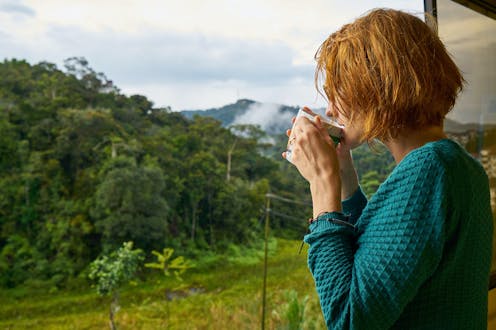Nope, coffee won't give you extra energy. It'll just borrow a bit that you'll pay for later
- Written by Emma Beckett, Senior Lecturer (Food Science and Human Nutrition), School of Environmental and Life Sciences, University of Newcastle

Many of us want (or should I say need?) our morning coffee to give us our “get up and go”. Altogether, the people of the world drink more than two billion cups of coffee each day[1].
You might think coffee gives you the energy to get through the morning or the day – but coffee might not be giving you as much as you think.
The main stimulant in coffee is the caffeine. And the main way caffeine works is by changing the way the cells in our brain interact with a compound called adenosine[2].
Read more: Plunger, espresso, filter? Just because your coffee is bitter, doesn't mean it's 'stronger'[3]
Getting busy, getting tired
Adenosine is part of the system[4] that regulates our sleep and wake cycle and part of why high levels of activity lead to tiredness. As we go about our days and do things, levels of adenosine rise[5] because it is released as a by-product as energy is used in our cells.
Eventually adenosine binds to its receptor[6] (parts of cells that receive signals) which tells the cells to slow down, making us feel drowsy and sleepy. This is why you feel tired after a big day of activity. While we are sleeping, energy use drops[7] lowering adenosine levels as it gets shuffled back into other forms. You wake up in the morning feeling refreshed. Well, if you get enough sleep that is.
If you are still feeling drowsy when you wake up caffeine can help, for a while. It works by binding to the adenosine receptor[8], which it can do because it is a similar shape. But it is not so similar that it triggers the drowsy slow-down signal like adenosine does. Instead it just fills the spots and stops the adenosine from binding there. This is what staves off the drowsy feeling.
No free ride
But there is a catch. While it feels energising, this little caffeine intervention is more a loan of the awake feeling, rather than a creation of any new energy.
This is because the caffeine won’t bind forever[9], and the adenosine that it blocks doesn’t go away. So eventually the caffeine breaks down, lets go of the receptors and all that adenosine that has been waiting and building up latches on and the drowsy feeling comes back – sometimes all at once.
So, the debt you owe the caffeine always eventually needs to be repaid, and the only real way to repay it is to sleep.
Timing is everything
How much free adenosine is in your system, that hasn’t attached to receptors yet, and how drowsy you are as a consequence will impact how much the caffeine you drink wakes you up. So, the coffee you drink later in the day[12], when you have more drowsy signals your system may feel more powerful.
If it’s too late in the day, caffeine can make it hard to fall asleep at bedtime. The “half life” of caffeine (how long it takes to break down half of it) is about five hours[13]). That said, we all metabolise caffeine[14] differently, so for some of us the effects wear off more quickly. Regular coffee drinkers might feel less of a caffeine “punch”, with tolerance[15] to the stimulant building up over time.
Caffeine can also raise levels of cortisol[18], a stress hormone that can make you feel more alert. This might mean caffeine feels more effective later in the morning, because you already have a natural rise in cortisol when you wake up. The impact of a coffee right out of bed might not seem as powerful for this reason.
If your caffeinated beverage of choice is also a sugary one, this can exacerbate the peak and crash feeling. Because while sugar does create actual energy in the body, the free sugars in your drink can cause a spike in blood sugar, which can then make you feel tired when you the dip comes afterwards[19].
While there is no proven harm of drinking coffee on an empty stomach, coffee with or after a meal[20] might hit you more slowly. This is because the food might slow down the rate at which the caffeine is absorbed.
Read more: Does coffee burn more fat during exercise? What the evidence tells us[21]
What about a strong tea or fizzy cola?
Coffee, of course, isn’t the only caffeinated beverage that can loan you some energy.
The caffeine in tea, energy drinks and other beverages still impacts the body in the same way. But, since the ingredients mostly come from plants, each caffeinated beverage has its own profile of additional compounds which can have their own stimulant effect[22], or can interact with caffeine to change its impacts.
Caffeine can be useful, but it isn’t magic. To create energy and re-energise our bodies we need enough food, water and sleep.
References
- ^ two billion cups of coffee each day (link.springer.com)
- ^ adenosine (www.sciencedirect.com)
- ^ Plunger, espresso, filter? Just because your coffee is bitter, doesn't mean it's 'stronger' (theconversation.com)
- ^ part of the system (www.sciencedirect.com)
- ^ levels of adenosine rise (www.ingentaconnect.com)
- ^ adenosine binds to its receptor (www.sciencedirect.com)
- ^ energy use drops (www.ingentaconnect.com)
- ^ adenosine receptor (onlinelibrary.wiley.com)
- ^ caffeine won’t bind forever (onlinelibrary.wiley.com)
- ^ Unsplash (images.unsplash.com)
- ^ CC BY (creativecommons.org)
- ^ later in the day (journals.sagepub.com)
- ^ five hours (www.ncbi.nlm.nih.gov)
- ^ metabolise caffeine (pubmed.ncbi.nlm.nih.gov)
- ^ tolerance (pubmed.ncbi.nlm.nih.gov)
- ^ Pexels (images.pexels.com)
- ^ CC BY (creativecommons.org)
- ^ raise levels of cortisol (www.ncbi.nlm.nih.gov)
- ^ dip comes afterwards (www.mayoclinic.org)
- ^ coffee with or after a meal (www.hsph.harvard.edu)
- ^ Does coffee burn more fat during exercise? What the evidence tells us (theconversation.com)
- ^ own stimulant effect (www.sciencedirect.com)

















